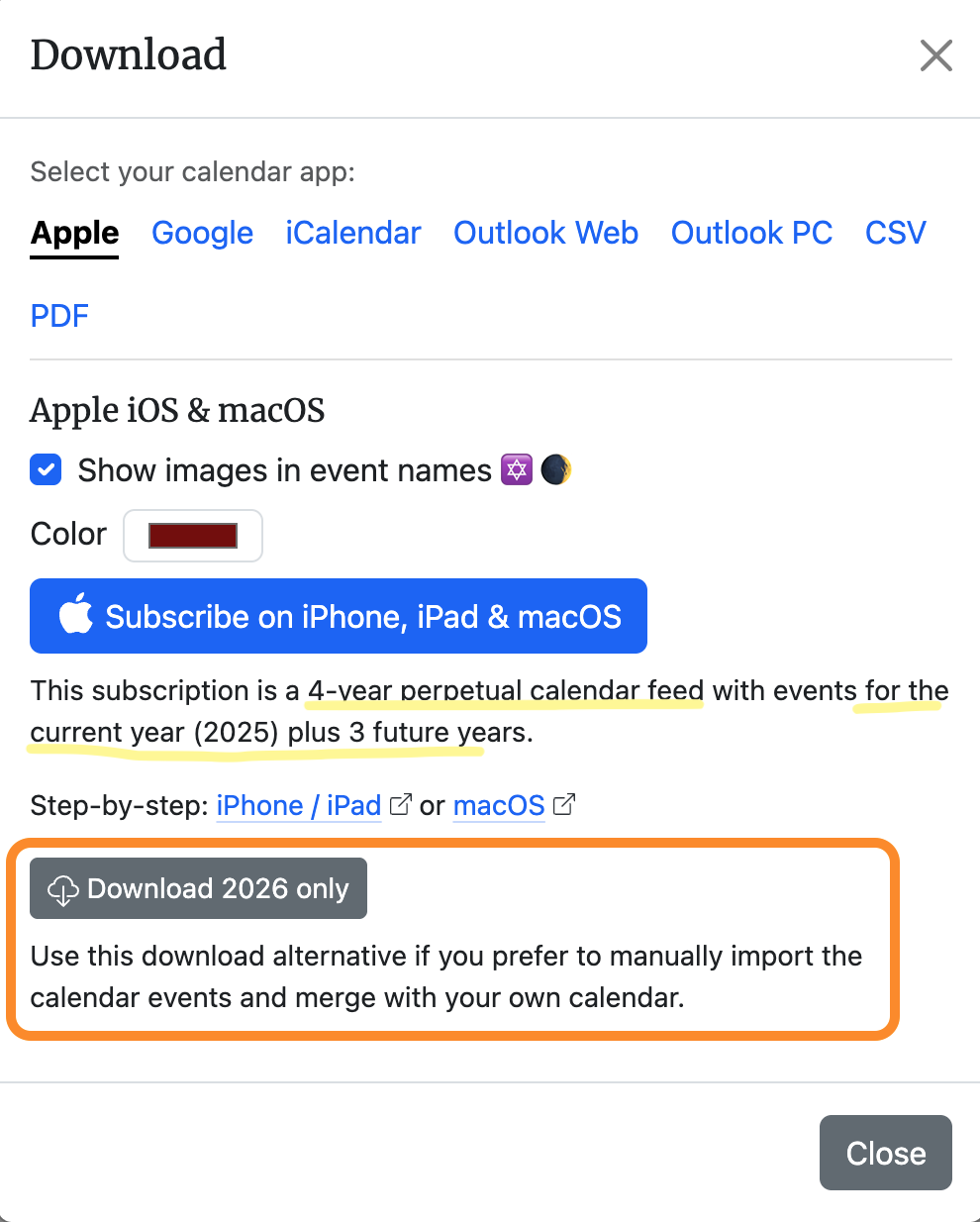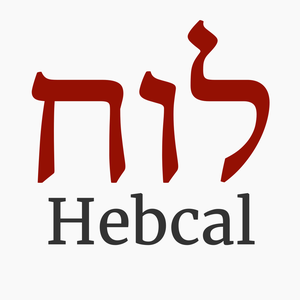Your comments
Hi, thanks for writing to Hebcal. We're sorry to hear that you're having difficulty getting a 2026 calendar on your device.
Calendars exported from Hebcal via our subscription feeds (using iCalendar format) are typically “perpetual”. That is, they contain events for the current year (Gregorian or Hebrew) plus some number of years into the future. Most downloads (including Apple, Google Calendar, and Microsoft Outlook) support these perpetual calendar subscription feeds.
When you create a custom calendar on Hebcal.com, you are presented with a dialog box that look like the screenshot below. Even if you enter a future year like 2026, you'll see text that says something like this (highlighted in yellow in the screenshot below):
This subscription is a 4-year perpetual calendar feed with events for the current year (2025) plus 3 future years.
You will also see a grey button that says something like Download 2026 only (highlighted in orange in the screenshot below). Click that button to download a 1-year .ics file and then import it into your calendar app, taking care to create a separate calendar and import Hebcal events into that new, separate calendar (lest you unintentionally add hundreds of events to your personal calendar).
Most users prefer the perpetual calendar feed because it's much easier to use and they can subscribe once and the calendar will be up-to-date for many years to come.
Also perhaps relevant reading:
https://www.hebcal.com/home/1398/number-of-years-in-calendar-feed-subscriptions

Thank you for the suggestion! We don't think we'll have time in the coming year to add this, but we appreciate hearing from you and will get back to you if we begin implementing this feature.
Thanks for your message. According to our calendar, April 9, 1942 (before sundown) is the 8th day of Pesach, not the 7th day of Pesach:
Thu, 9 April 1942 = 22nd of Nisan, 5702
כ״ב בְּנִיסָן תש״ב
Parashat Shmini
7th day of the Omer
🫓 Pesach VIII 🫓 in the Diaspora
If you click after sunset you will see this:
Thu, 9 April 1942 after sunset = 23rd of Nisan, 5702
כ״ג בְּנִיסָן תש״ב
Parashat Shmini
8th day of the Omer
Note the Hebrew date is displayed in two different places:
In Hebrew: כ״ג בְּנִיסָן תש״ב
In transliteration: 23rd of Nisan, 5702
Thanks for the bug report! We are terribly sorry for this inconvenience.
The issue has been fixed and the URLs work correctly once again.
You should celebrate your birthday every year!
Hebcal uses the anniversary algorithm defined in Calendrical Calculations by Edward M. Reingold and Nachum Dershowitz, which accords with Ashkenazic practice. Reingold and Dershowitz write:
Someone born on the thirtieth day of Marcheshvan, Kislev, or Adar I has his birthday postponed until the first of the following month in years where that day does not occur. [Calendrical Calculations p. 111]
In other words, on years where there is no 30th of Kislev, your birthday is celebrated on the 1st of Tevet.
Feature was released on December 1 and is currently available. Please give it a try and let us know how it works for you!
Thanks for the suggestion. Effective December 2025, we now support Hebrew dates in the Yahrzeit API as an alternative to Gregorian dates:
- hyX=5749 – Hebrew year
- hmX=Kislev – Hebrew month
- hdX=25 – Hebrew day of month
Hebrew month names may be specified in Hebrew (UTF-8) or transliterated using the same technique as on the Hebrew Date Converter REST API.
Please give it a try and let us know how it works for you!
Glad you were able to get this worked out!
Yes, we discovered a DNS error and fixed it last night. Our sincere apologies!
Customer support service by UserEcho


To subscribe to weekly Shabbat candle-lighting times and Torah portion by email, visit this page:
https://www.hebcal.com/email
Follow these instructions to create a personal yahrzeit, Hebrew birthday, or Hebrew anniversary calendar and then receive annual email reminders:
https://www.hebcal.com/home/4339/yahrzeit-anniversary-calendar-annual-email-reminders